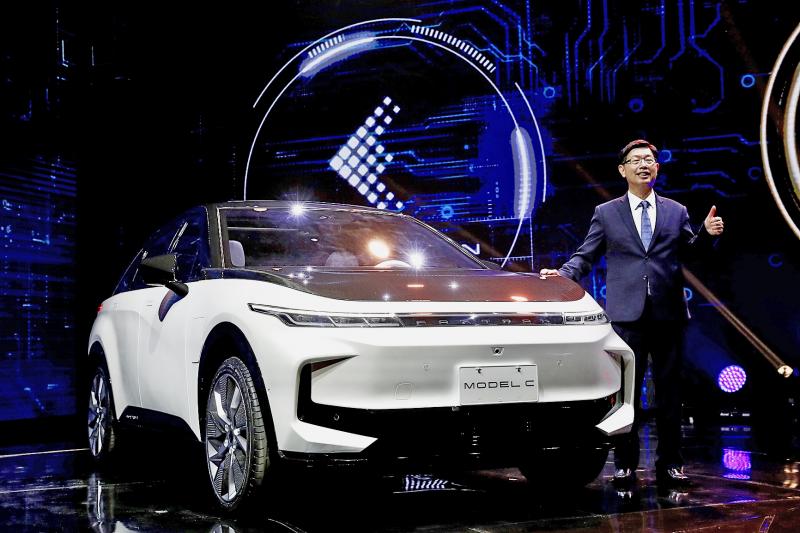Taiwan-based manufacturing giant Hon Hai Precision Industry Co (鴻海精密), which unveiled three electric vehicles (EVs) on Monday, expects its EV business to generate NT$1 trillion (US$35.8 billion) in sales for the group in five years.
Speaking to reporters after the introduction of the three EV prototypes, Hon Hai chairman Young Liu (劉揚偉) said that the company, known as Foxconn Technology Group (富士康科技集團) globally, expects its EV business to begin generating revenue next year at the earliest.
Sales momentum is expected to pick up in 2023 and revenue could potentially reach NT$1 trillion in five years, Liu said.

Photo: Ritchie B. Tongo, EPA-EFE
At the Hon Hai Tech Day on Monday, the iPhone assembler launched three self-developed EV models: a Model C sports utility vehicle, a flagship Model E passenger car and a Model T electric bus.
The venture, named Foxtron Vehicle Technologies Co (鴻華先進), is a collaboration between Hon Hai and Yulon Motor Co (裕隆汽車).
Foxtron is promoting the company’s MIH Open Platform for EV development, as Hon Hai aims to transform the platform into the “Android of the electric vehicle industry” in its bid to penetrate the global EV market.
As of June, more than 1,680 companies had joined the platform, including Bosch and Continental AG — both of which manufacture automotive parts — and tech giants Microsoft Corp and Oracle Co.
The open platform is expected to provide business opportunities to the members, Liu said.
In February, Hon Hai announced that it had joined forces with Fisker Inc, a US EV maker, to build a new EV model under the US brand, with the goal of starting mass production by the fourth quarter of 2023.
While Fisker has its own EV platform, if the MIH Open Platform could provide competitive solutions in chassis production, Liu said that he expects the US brand to consider switching platforms.
The EV business is so huge that Hon Hai plans to manufacture its EVs regionally, with plants in the US, South America, Europe, the Middle East, India, Southeast Asia, East Asia and China, while using the common auto chassis from the platform, he said.
The diversification of manufacturing allows Hon Hai to cater to different markets and lower production costs, Liu added.

Nissan Motor Co has agreed to sell its global headquarters in Yokohama for ¥97 billion (US$630 million) to a group sponsored by Taiwanese autoparts maker Minth Group (敏實集團), as the struggling automaker seeks to shore up its financial position. The acquisition is led by a special purchase company managed by KJR Management Ltd, a Japanese real-estate unit of private equity giant KKR & Co, people familiar with the matter said. KJR said it would act as asset manager together with Mizuho Real Estate Management Co. Nissan is undergoing a broad cost-cutting campaign by eliminating jobs and shuttering plants as it grapples

PERSISTENT RUMORS: Nvidia’s CEO said the firm is not in talks to sell AI chips to China, but he would welcome a change in US policy barring the activity Nvidia Corp CEO Jensen Huang (黃仁勳) said his company is not in discussions to sell its Blackwell artificial intelligence (AI) chips to Chinese firms, waving off speculation it is trying to engineer a return to the world’s largest semiconductor market. Huang, who arrived in Taiwan yesterday ahead of meetings with longtime partner Taiwan Semiconductor Manufacturing Co (TSMC, 台積電), took the opportunity to clarify recent comments about the US-China AI race. The Nvidia head caused a stir in an interview this week with the Financial Times, in which he was quoted as saying “China will win” the AI race. Huang yesterday said

TEMPORARY TRUCE: China has made concessions to ease rare earth trade controls, among others, while Washington holds fire on a 100% tariff on all Chinese goods China is effectively suspending implementation of additional export controls on rare earth metals and terminating investigations targeting US companies in the semiconductor supply chain, the White House announced. The White House on Saturday issued a fact sheet outlining some details of the trade pact agreed to earlier in the week by US President Donald Trump and Chinese President Xi Jinping (習近平) that aimed to ease tensions between the world’s two largest economies. Under the deal, China is to issue general licenses valid for exports of rare earths, gallium, germanium, antimony and graphite “for the benefit of US end users and their suppliers

Dutch chipmaker Nexperia BV’s China unit yesterday said that it had established sufficient inventories of finished goods and works-in-progress, and that its supply chain remained secure and stable after its parent halted wafer supplies. The Dutch company suspended supplies of wafers to its Chinese assembly plant a week ago, calling it “a direct consequence of the local management’s recent failure to comply with the agreed contractual payment terms,” Reuters reported on Friday last week. Its China unit called Nexperia’s suspension “unilateral” and “extremely irresponsible,” adding that the Dutch parent’s claim about contractual payment was “misleading and highly deceptive,” according to a statement